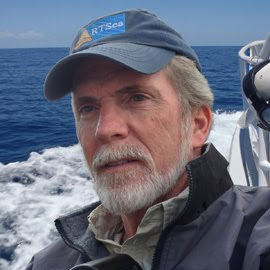 Marine parks serve a vital role in protecting regional marine ecosystems which then often serve to benefit the biodiversity of larger open ocean areas by providing a sheltered breeding ground and/or food source for many different species - in essence, a safe haven that serves an even larger community.
Marine parks serve a vital role in protecting regional marine ecosystems which then often serve to benefit the biodiversity of larger open ocean areas by providing a sheltered breeding ground and/or food source for many different species - in essence, a safe haven that serves an even larger community.We often think of marine parks as being located in temperate to tropical waters. Indeed, recently designated parks have been in such places as governing agencies realize the importance of these fragile ecosystems (Read prior post). But the purpose and value of marine parks is not
 limited to just such regions. Kathleen Kobbe of The International Office recently brought to my attention the Kosterhavet National Marine Park in Sweden. This park, designated in September, 2009, is Sweden's first national marine park and is home to thousands of marine species, from sponges and coral to sea birds and harbor seals that use the park as a breeding ground.
limited to just such regions. Kathleen Kobbe of The International Office recently brought to my attention the Kosterhavet National Marine Park in Sweden. This park, designated in September, 2009, is Sweden's first national marine park and is home to thousands of marine species, from sponges and coral to sea birds and harbor seals that use the park as a breeding ground.The blog Explore West Sweden interviewed the park's head biologist, Martin Larsvik. "In the Kosterhavet Marine National Park there are about 6000 marine species. More than 200 of those have not been found elsewhere in Sweden, but can be found further west in the Atlantic Ocean. There are, for instance, large brown macroalgae (kelp), sponge animals, polychaete worms, crabs, starfish, sea cucumbers and fish. The most spectacular species is the eye coral (Lophelia pertusa), forming coral reefs at a depth of 85 meters," Larsvik explained.
Commercial fishing is highly regulated in the park and this is an important feature of a cold water protected zone like at Kosterhavet (41 to 45 degrees Fahrenheit). Many of the major fish species sought by commercial fishermen are cold water species. So, while we are inclined to preserve and protect the more obvious beauty of tropical reefs and other warmer water environments, we must also keep an eye on protecting those chillier environments that can be threatened by large-scale industrial fishing.
Grattis, Sweden!

















No comments:
Post a Comment